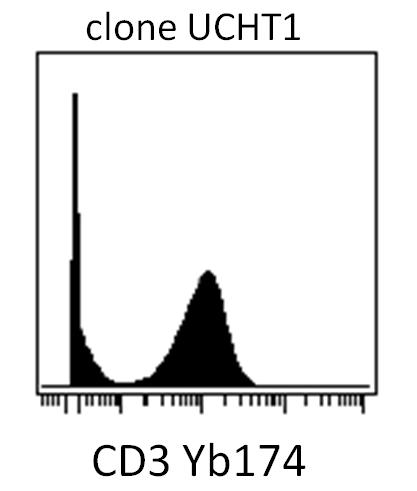CD3E Mouse Monoclonal Antibody [Clone ID: UCHT1]
Other products for "CD3E"
Specifications
| Product Data | |
| Clone Name | UCHT1 |
| Applications | FC, FN, IHC, IP |
| Recommended Dilution | Flow Cytometry: The epitope for UCHT1, CD3 is resistant to fixation. For purposes where pre-fixed cells are stained, this antibody is recommended. Immunoprecipitation. Immunohistochemistry on Frozen Sections. Functional Assay: The immobilized UCHT1 antibody initiates a signaling pathway resulting in T cell activation and proliferation. |
| Reactivities | Human, Monkey |
| Host | Mouse |
| Isotype | IgG1 |
| Clonality | Monoclonal |
| Immunogen | Human thymocytes followed by Sezary T cells |
| Specificity | This antibody recognizes the CD3 antigen of the TCR/CD3 complex on mature Human T cells. The UCHT1 antibody reacts with the epsilon chain of the CD3 complex. |
| Formulation | Azide Free phosphate buffered saline (PBS), pH~7.4 and 0.2 μm filter sterilized State: Azide Free State: Liquid purified Ig fraction (> 95% pure by SDS-PAGE) |
| Concentration | lot specific |
| Purification | Protein-A Affinity Chromatography |
| Conjugation | Unconjugated |
| Storage | Store undiluted at 2-8°C. DO NOT FREEZE! |
| Stability | Shelf life: one year from despatch. |
| Gene Name | CD3e molecule |
| Database Link | |
| Background | CD3 complex is crucial in transducing antigen-recognition signals into the cytoplasm of T cells and in regulating the cell surface expression of the TCR complex. T cell activation through the antigen receptor (TCR) involves the cytoplasmic tails of the CD3 subunits CD3 gamma, CD3 delta, CD3 epsilon and CD3 zeta. These CD3 subunits are structurally related members of the immunoglobulins super family encoded by closely linked genes on human chromosome 11. The CD3 components have long cytoplasmic tails that associate with cytoplasmic signal transduction molecules. This association is mediated at least in part by a double tyrosine-based motif present in a single copy in the CD3 subunits. CD3 may play a role in TCR-induced growth arrest, cell survival and proliferation. The CD3 antigen is present on 68-82% of normal peripheral blood lymphocytes, 65-85% of thymocytes and Purkinje cells in the cerebellum. It is never expressed on B or NK cells. Decreased percentages of T lymphocytes may be observed in some autoimmune diseases. |
| Synonyms | T3/Leu-4 |
| Reference Data | |
| Protein Families | Druggable Genome, Transmembrane |
| Protein Pathways | Hematopoietic cell lineage, Primary immunodeficiency, T cell receptor signaling pathway |
Documents
| Product Manuals |
| FAQs |
| SDS |
{0} Product Review(s)
0 Product Review(s)
Submit review
Be the first one to submit a review
Product Citations
*Delivery time may vary from web posted schedule. Occasional delays may occur due to unforeseen
complexities in the preparation of your product. International customers may expect an additional 1-2 weeks
in shipping.






























































































































































































































































 Germany
Germany
 Japan
Japan
 United Kingdom
United Kingdom
 China
China



